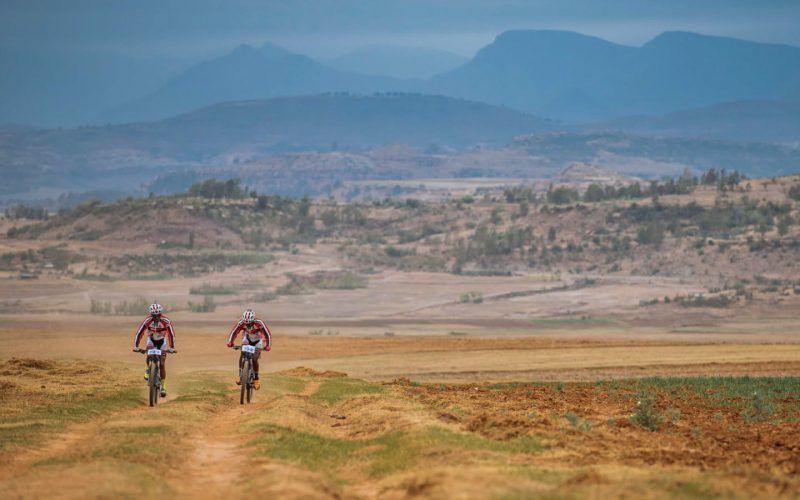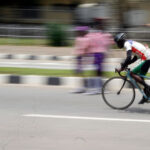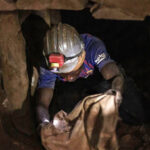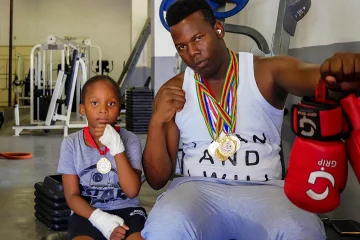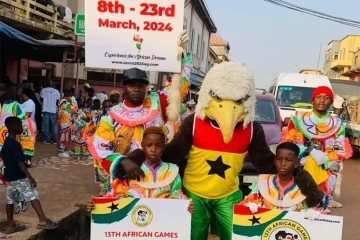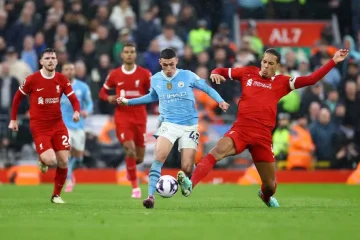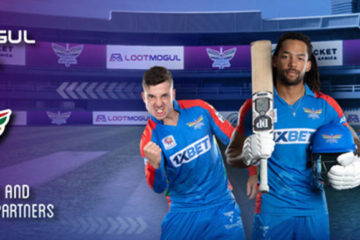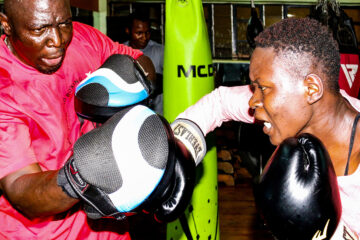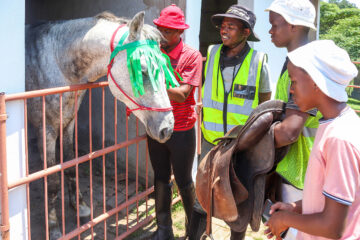Photographer: WAYNE REICHE
THREE decades ago, Lesotho’s cycling culture was non-existent. Bicycles were just used as a means of transport or for recreational purposes. But through the contribution of various people, and the backing of an entire community, the sport is now one of Lesotho’s most visible codes and has even produced Olympians.
The most important seeds in the growth of cycling in Lesotho were planted in the early 2000s when a small group of Basotho riders travelled to South Africa to compete on a scholastic and professional level. At that time, road racing was the only popular form of cycling. The main tournament to support the sport was the Tour de Lesotho. The three-day 500km race first took place in 2000 and attracted riders mainly from South Africa. Seven-time Grand Tour winner and Olympic medallist Chris Froome participated in the last iteration of the race in 2006.
It wasn’t until 2011, however, that mountain biking picked up momentum with the formation of the Lesotho Sky. The six-day annual mountain bike race was conceptualised and managed by Christian Schmidt. Schmidt grew up in Germany but moved to Lesotho at a young age when his father moved to Maseru for work. He became familiar with the landscapes of the mountainous region.

In 2007, while studying finance at the University of Cape Town (UCT), Schmidt became immersed in the strong culture of cycling that exists in that city. He took part in several races like the Cape Town Epic, Stellenbosch Mountain Bike, Wines2Whales, Dirtopia Enduros and Stargazer Mountain Bike, which inspired him to organise his own event.
“I’d always wanted to participate in the Cape Epic and while the entry was really expensive and it was difficult to enter, I really enjoyed cycling,” said Schmidt. “And after having cycled a lot in Lesotho, I asked myself: how come cycling is so popular in South Africa but there are no big cycling events in Lesotho? How come there aren’t any big cycling tourism activities? Lesotho is in the middle of South Africa and is full of mountains but it doesn’t have a cycling culture.
“That’s what gave me inspiration and I thought let’s try this. I know Lesotho and I reached out to friends and contacts to make it happen.”
The beginning
The first event was hosted in November 2011 and had 22 participants. Most of them were friends from UCT but it also had a few Basotho as well as a couple of international riders. It was the first time that he and his friend Darrol Howes had organised anything of this magnitude
“We encountered a lot of challenges that we didn’t anticipate,” he said. “One example is the route. We knew the route very well and we had spent weeks scouting and riding. The route is around 350km long over six days. We started marking and we painted arrows on rocks. We quickly realised that there are a lot of people along the routes and there are kids that like to do naughty things. So, sometimes an arrow will appear, and all of a sudden, it’s pointing in the other direction. Subsequently, a lot of riders got lost.
“Another challenging issue was hospitality. We didn’t know some of the establishments well enough. We had done bookings and reservations and communicated everything but it turned out that the one accommodation had another big group sharing the venue and they had a party at night. Our riders were tired from the day and wanted to rest so that created an interesting moment.”

Despite the troubles that arose, the first event was a good learning experience and confirmation that their concept was possible and manageable. “We felt like we had failed, to be honest,” Schmidt said. “After that week, we felt like we had tried our best and we couldn’t have imagined that people actually enjoyed themselves because of all the things that went wrong.
“We were surprised that the people had fun and we got words of encouragement from riders and they gave us the benefit of the doubt. We decided that we wanted to repeat this event and the following year was a lot better, and we had more participants. Every year was a learning curve as we accommodated more riders.”
Now forging champions
From the inaugural event, the race has grown to attract big sponsors and over 100 riders from across the globe. It is recognised as a Class 1 Union Cycliste Internationale (UCI) stage race and participants can accrue points that can increase their country rankings which can help with qualifying for the Olympics.
Phetetso Monese became a trailblazer as he was the first cross-country mountain biker from Lesotho to qualify and compete at the 2016 Rio Olympics. He also competed in the 2014 Commonwealth Games in Glasgow. That year, the 37-year-old came second overall and won the fourth day of the 2014 edition of the Lesotho Sky.
His accomplishments raised the profile of the sport and paved a lane for other cyclists, like Tumelo Makae, to follow. Makae made his debut on the international stage at the 2014 Summer Youth Olympic Games in China and was one of two riders from Lesotho to take part. The 25-year-old only started cycling seriously in 2013. His entry to the sport was through his close friend Moselantja Pule, who was an avid rider.

“She always invited me to come and watch her race and I never did. I never really looked into the sport or considered joining because I was a footballer back then,” said Makae. “After she passed away in a car accident, I started to ride bikes in her memory.”
Other Basotho riders who have competed in overseas competitions include Eric Ramohanoe, Teboho Khantsi, Lichaba West, Katleho Manasi, Malefetsane Lesofe and Paseka Makhebesela. They were all part of the now-disbanded Sufferfest Africa Dream Team. The group was the first African team to be licensed by the UCI. At the height of their success they notched a top-20 ranking, the first African team to accomplish such a feat.
The contributions of many
Mark West, coach of the national mountain-biking team, has also been a key figure in the development of mountain biking in Lesotho. The Welsh-born coach arrived in Lesotho over three decades ago with a temporary visa to work as an educator. He did not have any intention of getting involved in the sport until one of his students, Pholoko Makahora, showed strong interest. After attending a few of his races in South Africa, West saw that the young cyclist had potential and bought him a new bike.
Makakhora would be the first of many young cyclists he helped in his personal capacity or as the then secretary of the Lesotho Cycling Federation and head of high performance for the Lesotho National Olympic Committee. In these roles he was involved administratively, helping to find sponsors and achieving recognition from the UCI.
After the 2013 World Mountain Bike Championships, West formed the Sufferfest team as part of an effort to help cyclists find funding and resources to compete overseas without having to depend on the federation. According to him, relying on the federation made it harder to be organised and be more consistent in competitions as they often had to contend with the federation not having enough funds.

The two-year period between 2016 and 2017 was the peak of cycling as a sport in the country. In the first quarter of 2016, Lesotho hosted the African Mountain Bike Continental Championships where Monese finished third in the men’s elite category. Then later in the year, he travelled to Brazil for the Summer Olympics.
In the beginning of 2017, the Sufferfest team competed in their first UCI Mountain Bike World Championships in the Cross-country Olympic, Cross-country team relay, and Downhill individual categories in Cairns, Australia. Velosolutions, a company that builds asphalt and modular pump tracks, would also enter the fold in late 2017 with the construction of the first such track in Lesotho. The company is managed by Swiss commentator and former World Cup-winning BMX biker Claudio Caluori.
Under the Pump for Peace initiative, the company builds pump tracks in underprivileged and war-torn communities around the world. By constructing these tracks, they aim to provide access to the sport of cycling and to promote a healthy lifestyle.
Caluori visited Lesotho as part of his involvement in a documentary called Following the Horseman. He then identified Roma, a small town located 40km south of Maseru, as a prime location for the maiden pump track in the country. There was already the presence of a bike repair shop and an active cycling culture in the community.
Community taking ownership
The project was financed mostly through fundraising and sponsorship. Caluori also sold some of his personal belongings to add to available funds. The construction of the pump track took about four weeks. The people in Roma eagerly volunteered their time and labour and helped build the track. They continue to maintain its upkeep.
“Once the track was up and running, that’s when the community became a lot more active. They organised a system to provide bikes for the kids, to keep the track clean, and have little events every week. The whole thing just grew and it’s become more than a pump track,” said Calouri.
Before Covid-19 hit, the pump track was the site of the internationally recognised Sky Cycling League. It is organised by Tumelo Makhetha, a volunteer and community leader in Roma. Initially, the competition only had 50 riders competing and that number doubled with more than 100 children coming from different parts of Lesotho.

“We as a community were fascinated with the pump track and excited about what it could do for us. The Sky League was formed as something to benefit the community and leverage the presence of the pump track. The culture of cycling is growing really fast and Lesotho is a great place for adventure sports – whether it is motorcycling or mountain biking,” said Makhetha.
The success of the Roma facility led to the construction of the Maseru and Mantsonyane tracks. Two BMX stars, Khothalang Leuta and Mosito Mohapi, have emerged from the maiden pump track. Both of them recently competed in the 2021 Red Bull UCI Pump Track World Championship in Portugal. It was Leuta’s debut on the international stage whereas it is Mohapi’s second appearance – his first being the 2019 edition that was hosted in Switzerland.
Influencing a new generation
Leuta and Mohapi have set a positive and impactful example for younger cyclists in the community. Their peers now have a glimpse of the opportunities and possibilities in the sport. Leuta has been remarkably influential in getting more girls involved, especially the younger ones. “She’s so fast. She’s great and she’s shown us how to ride well,” said Nolofatso Buti, a nine-year-old girl who frequents the pump track.
The cultural notions placed on girls in Lesotho often mean that they will avoid activities and duties that are perceived to be designated for men.
“Initially, we really struggled to get the girls on the track. They were completely intimidated by the boys. And it wasn’t a situation where the boys discouraged them or anything like that. But, from a cultural point of view, it was just not done. We had to beg her [Leuta] to race because she had just started on the pump track and I knew that she would ride around the village. We had to fight this big perception that this sport is for males only. But now it’s widely accepted that the girls ride as well,” says Maryke Zietsman, communications manager of Velosolutions.

Makhetha adds: “The culture raises girls not to ride bicycles. Khothalang was the first noticeable girl who took interest. I’ve known her since she started riding but because girls are not that interested in sports, I never thought she would pick it up. I never really thought she could take up riding and do it to the level that she is doing now.”
The participation of younger cyclists helps in further growing the sport. According to West, starting the sport at a young age makes the basics more instinctive earlier. He notes that getting younger children involved in the sport is a key component in Lesotho becoming more competitive on the world stage.
“It’s very important that riders have the basic skills and those skills come from playing on the bikes at a young age. What we found is that our riders have the physical ability to be able to compete but they don’t have the same natural skills in comparison to riders who have been on their bikes their whole lives,” said West.
“That is why the pump track is so ideal for us because that’s where the skills are being taught to kids. We need to have a wider pool of talent and I would like to see new kids coming through from the pump track; kids we would have not normally have been able to see. I really believe that there must be some superstars. It’s just a matter of being able to find them and be able to nurture them from a young age.”


